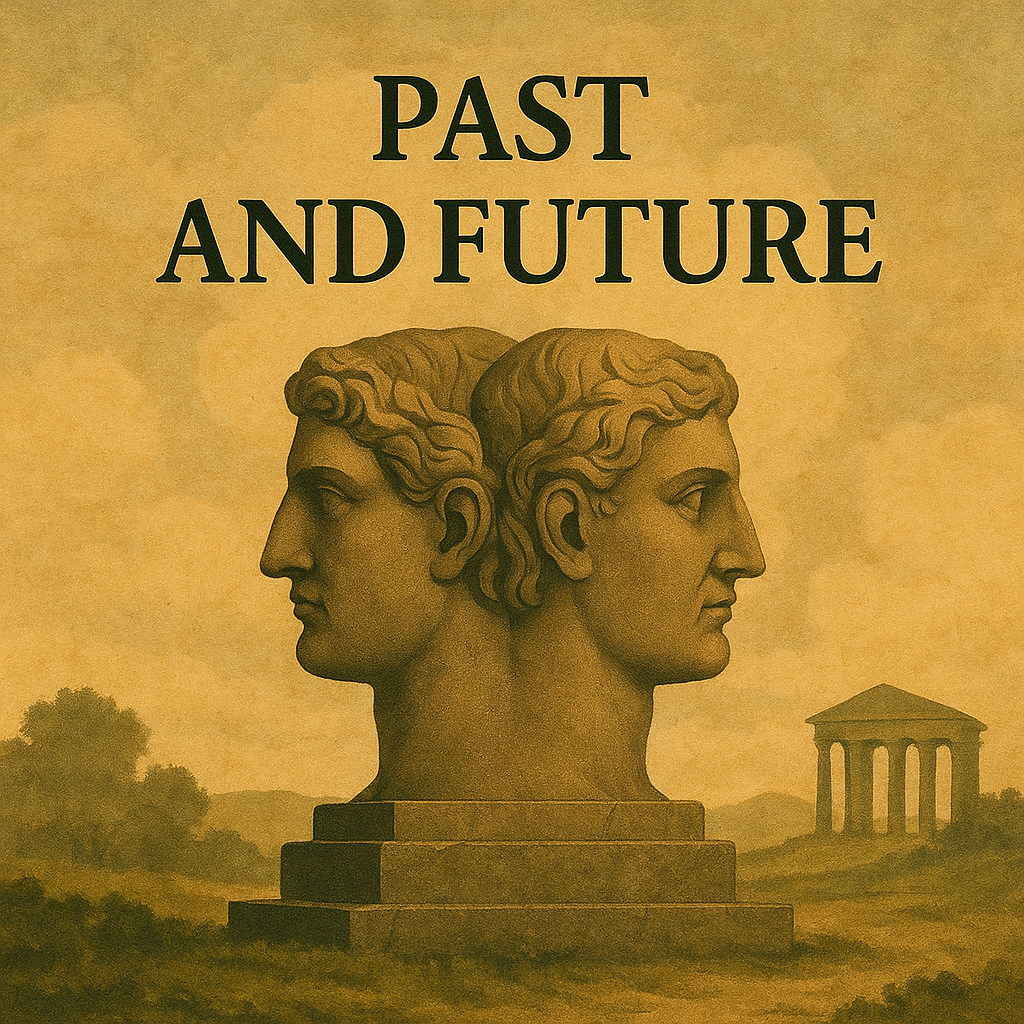We live with two faces.
One turned to the past, endlessly replaying regrets, injustices, losses, and former glories. One turned to the future, imagining disasters, striving toward distant goals, or craving outcomes we may never see.
But how often do we face the present, fully and consciously?
In Roman mythology, Janus was the god of transitions and thresholds. He was depicted with two faces, one looking backward and one looking forward. He presided over beginnings, endings, and change. Yet he had no face turned toward the now.
We, too, often live like Janus, caught between memory and anticipation, neglecting the only place where life actually happens: the present.
And in doing so, we risk paralysing the very actions that would shape the future we hope for.ange happens. Every step toward a better life must be taken now, not later.
The Two Faces of Janus
Modern life pulls us away from the present with relentless force.
Our minds return again and again to the past:
- Regret over mistakes and missed opportunities
- Resentment toward others for past wrongs
- Nostalgia for times that can never return
And we fixate on the future:
- Anxiety about what may go wrong
- Obsessive planning for ideal outcomes
- Perfectionism that prevents starting anything at all
Both orientations serve a purpose. We must learn from the past and plan for the future. But when they dominate our attention, they distort our experience of life.
The cost is profound. The present moment is squandered.
The Cost of a Divided Mind
When our attention is consumed by past and future, we become paralysed.
Opportunities pass unnoticed. Small meaningful actions are avoided because they feel insignificant compared to grand future visions or overwhelming fears.
We procrastinate not because we are lazy, but because the mind whispers, "Why bother? The future is too uncertain. The past already defines who you are."
We disconnect from the people around us. Conversations become half-hearted. Creativity dwindles. Even rest becomes restless, haunted by what was or what might be.
I noticed this myself only yesterday. While out walking, I passed a lake in the park. Without warning, I felt a sharp pang of guilt from a memory years ago, when I had gone wild swimming in a lake where swimming was not permitted. I had missed the signs and was firmly told off.
That moment, trivial in hindsight, jolted back into my mind and cast a shadow over an otherwise good day. The past had reached forward and gripped the present, robbing it of some of its lightness.
And yet it is in the present that all change happens. Every step toward a better life must be taken now, not later.
How the Future Is Actually Made
We imagine that the future is shaped by grand decisions or brilliant plans. But this is rarely true.
The future emerges from small actions, chosen and repeated with care:
- One workout shapes health
- One moment of patience shapes a relationship
- One page of reading shapes knowledge
- One act of integrity shapes character
As Lara Croft says in Tomb Raider (2018):
"We all make our own fate."
Not through dramatic gestures, but through the quiet discipline of the everyday.
Yet when we dwell obsessively on distant outcomes, we cripple our ability to act in the present. The mind says, "It is not enough. It will not matter." So nothing is done, and fate is left to drift.
To build a better future, for ourselves and for others, we must bring our focus back to the next small action, here and now.
Four Forces That Pull Us Away
Why is it so hard to live in the present?
Because we are shaped by powerful forces that constantly tug us into the past or future.
1. Social Norms
We absorb unspoken expectations about what success, happiness, and purpose should look like. These often generate future anxieties, comparing ourselves to imagined ideals, or past shame over not fitting the mould.
2. Limited Knowledge
We fear making mistakes because we cannot know all outcomes. But the unknowable nature of the future tempts us to overthink and delay. We forget that imperfect action is better than perfect inaction.
3. Learned Behaviour
Many of our patterns of regret and worry are conditioned. We grew up ruminating on what went wrong or fearing what might go wrong. These are habits of mind that can be retrained, but only when we become aware of them.
4. Biological Impulse
Our nervous system evolved to prioritise survival, not inner peace. It is wired to scan for threats in both memory and anticipation. Left unchecked, this becomes a constant pull away from the present, flooding us with fear or longing.
Returning to the Present
How can we resist the Janus mind?
Not by ignoring the past and future entirely. That is neither wise nor possible.
But by learning to direct our gaze consciously. To notice when we have drifted, and to bring ourselves back.
Here are simple practices:
- When you notice rumination or anxiety, pause and take three conscious breaths
- Ask, "What small, good thing can I do right now?"
- Anchor attention in the body, the only place that is always present
- Reframe goals. Instead of, "I must achieve X," ask, "What is the next right step?"
Above all, act. Even small, imperfect actions in the present begin to shift your trajectory. They are the raw material of fate.
The Wiser Janus
We can learn from Janus, but we must also go beyond him.
To live fully, we need to honour the past, prepare for the future, and act in the present. Not to be trapped in one perspective, but to move fluidly between them, always returning to now as the ground of being.
Marcus Aurelius said it simply:
"Confine yourself to the present."
And as Lara Croft reminds us:
"We all make our own fate."
Not through abstract plans, nor through endless regret.
Through this breath. This choice. This step.
Here is where your future is born.

